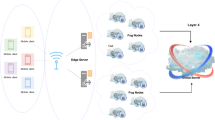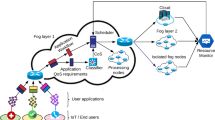Abstract
The proliferation of smart services and devices leads to connection delay and high traffic load in networks connecting cloud computing to end users. Fog computing resolve these issues by bringing cloud services closer to end users and consequently delivers better service quality to requested tasks. However, assigning resources to tasks is challenging due to complex and strict quality of service requirements. Moreover, concurrently optimizing multiple objectives such as network usage, energy consumption and delay increases complexity of the scheduling process. In this regard, we investigate optimal task-resource pairing for efficient scheduling to simultaneously minimize delay, cost and energy consumption. The problem is modeled as a multi-objective optimization problem to efficiently schedule latency-sensitive tasks on fog resources. The proposed solution consists of three main key components, viz a batch system, a ranking, and a priority method. The batch system exploits ranking and priority methods to optimally pair tasks and fog nodes. The significant advantage of the presented approach is the reduction of the search space through batches. The proposed mechanism is implemented on iFogSim simulator and results show that the proposed system significantly reduces delay and energy.









Similar content being viewed by others
Data Availability
All data generated or analysed during this study are included in this article.
References
Flexera: Flexera releases state of the cloud report. Accessed from https://www.flexera.com/about-us/press-center/flexera-releases-2020-state-of-the-cloud-report.html (2020)
Lee, Y., Lee, U.: Reference architecture and operation model for ppp (public-private-partnership) cloud. J. Inf. Process. Syst. 17(2), 284–296 (2021)
Kannan, A., LaRiviere, J., McAfee, R.P.: Characterizing the usage intensity of public cloud. ACM Trans. Econ. Comput. 9(3), 1–18 (2021)
Datta, P., Sharma, B.: A survey on iot architectures, protocols, security and smart city based applications. In: 2017 8th International Conference on Computing, Communication and Networking Technologies (ICCCNT), pp. 1–5 (2017). IEEE
Rani, R., Kumar, N., Khurana, M., Kumar, A., Barnawi, A.: Storage as a service in fog computing: a systematic review. J. Syst. Archit. 116, 102033 (2021)
Apostu, A., Puican, F., Ularu, G., Suciu, G., Todoran, G., et al.: Study on advantages and disadvantages of cloud computing-the advantages of telemetry applications in the cloud. Recent Adv. Appl. Comput. Sci. Digit. Serv. 2103, 1 (2013)
Abdalla, P.A., Varol, A.: Advantages to disadvantages of cloud computing for small-sized business. In: 2019 7th International Symposium on Digital Forensics and Security (ISDFS), pp. 1–6 (2019). IEEE
Coles-Kemp, L., Reddington, J., Williams, P.A.: Looking at clouds from both sides: the advantages and disadvantages of placing personal narratives in the cloud. Inf. Secur. Tech. Rep. 16(3–4), 115–122 (2011)
Chhabra, R., Verma, S., Krishna, C.R.: A survey on driver behavior detection techniques for intelligent transportation systems. In: 2017 7th International Conference on Cloud Computing, Data Science & Engineering-Confluence, pp. 36–41 (2017). IEEE
Bonomi, F., Milito, R., Zhu, J., Addepalli, S.: Fog computing and its role in the internet of things. In: Proceedings of the First Edition of the MCC Workshop on Mobile Cloud Computing, pp. 13–16 (2012)
Xu, X., Hao, J., Yu, L., Deng, Y.: Fuzzy optimal allocation model for task-resource assignment problem in a collaborative logistics network. IEEE Trans. Fuzzy Syst. 27(5), 1112–1125 (2018)
Mahmud, R., Kotagiri, R., Buyya, R.: Fog Computing: A Taxonomy, Survey and Future Directions, pp. 103–130. Springer, Berlin (2018)
Gorbenko, A., Popov, V.: Task-resource scheduling problem. Int. J. Autom. Comput. 9(4), 429–441 (2012)
Kaur, N., Kumar, A., Kumar, R.: A systematic review on task scheduling in fog computing: taxonomy, tools, challenges, and future directions. Concurr. Comput. 33, e6432 (2021)
Hosseinioun, P., Kheirabadi, M., Kamel Tabbakh, S.R., Ghaemi, R.: atask scheduling approaches in fog computing: a survey. Trans. Emerg. Telecommun. Technol. 33, e3792 (2020)
Islam, T., Hashem, M.: Task scheduling for big data management in fog infrastructure. In: 2018 21st International Conference of Computer and Information Technology (ICCIT), pp. 1–6 (2018). IEEE
Jazayeri, F., Shahidinejad, A., Ghobaei-Arani, M.: A latency-aware and energy-efficient computation offloading in mobile fog computing: a hidden Markov model-based approach. J. Supercomput. 77(5), 4887–4916 (2021)
Kalantary, S., Torkestani, J.A., Shahidinejad, A.: Resource discovery in the internet of things integrated with fog computing using Markov learning model. J. Supercomput. 77, 1–22 (2021)
Madhura, R., Elizabeth, B.L., Uthariaraj, V.R.: An improved list-based task scheduling algorithm for fog computing environment. Computing 103, 1–37 (2021)
Shetti, K.R., Fahmy, S.A., Bretschneider, T.: Optimization of the heft algorithm for a cpu-gpu environment. In: 2013 International Conference on Parallel and Distributed Computing, Applications and Technologies, pp. 212–218 (2013). IEEE
Sujana, J.A.J., Geethanjali, M., Raj, R.V., Revathi, T.: Trust model based scheduling of stochastic workflows in cloud and fog computing. In: Cloud Computing for Geospatial Big Data Analytics, pp. 29–54. Springer, Cham (2019)
Gad-Elrab, A.A.A., Noaman, A.Y.: A two-tier bipartite graph task allocation approach based on fuzzy clustering in cloud-fog environment. Futur. Gener. Comput. Syst. 103, 79–90 (2020). https://doi.org/10.1016/j.future.2019.10.003
Oueis, J., Strinati, E.C., Barbarossa, S.: The fog balancing: load distribution for small cell cloud computing. In: 2015 IEEE 81st Vehicular Technology Conference (VTC Spring), pp. 1–6 (2015). IEEE
Naha, R.K., Garg, S., Chan, A., Battula, S.K.: Deadline-based dynamic resource allocation and provisioning algorithms in fog-cloud environment. Futur. Gener. Comput. Syst. 104, 131–141 (2020)
Wadhwa, H., Aron, R.: Tram: technique for resource allocation and management in fog computing environment. J. Supercomput. 78, 1–24 (2021)
Abdulredha, M.N., Bara’a, A.A., Jabir, A.J.: An evolutionary algorithm for task scheduling problem in the cloud-fog environment. J. Phys. 1963, 012044 (2021)
Ijaz, S., Munir, E.U., Ahmad, S.G., Rafique, M.M., Rana, O.F.: Energy-makespan optimization of workflow scheduling in fog-cloud computing. Computing 103, 1–27 (2021)
Zhang, H., Wu, Y., Sun, Z.: Eheft-r: multi-objective task scheduling scheme in cloud computing. Complex Intell. Syst. 2021, 1–8 (2021)
Xu, F., Yin, Z., Gu, A., Li, Y., Yu, H., Zhang, F.: Adaptive scheduling strategy of fog computing tasks with different priority for intelligent production lines. Proc. Comput. Sci. 183, 311–317 (2021)
Arshed, J.U., Ahmed, M.: Race: resource aware cost-efficient scheduler for cloud fog environment. IEEE Access 9, 65688–65701 (2021)
Verma, K., Kumar, A., Islam, M.S.U., Kanwar, T., Bhushan, M.: Rank based mobility-aware scheduling in fog computing. Inform. Med. Unlocked 24, 100619 (2021)
Subbaraj, S., Thiyagarajan, R.: Performance oriented task-resource mapping and scheduling in fog computing environment. Cogn. Syst. Res. 70, 40–50 (2021)
Abreu, D.P., Velasquez, K., Assis, M.R.M., Bittencourt, L.F., Curado, M., Monteiro, E., Madeira, E.: A rank scheduling mechanism for fog environments. In: 2018 IEEE 6th International Conference on Future Internet of Things and Cloud (FiCloud), pp. 363–369 (2018). IEEE
Benblidia, M.A., Brik, B., Merghem-Boulahia, L., Esseghir, M.: Ranking fog nodes for tasks scheduling in fog-cloud environments: a fuzzy logic approach. In: 2019 15th International Wireless Communications & Mobile Computing Conference (IWCMC), pp. 1451–1457 (2019). IEEE
Tychalas, D., Karatza, H.: A scheduling algorithm for a fog computing system with bag-of-tasks jobs: simulation and performance evaluation. Simul. Model. Pract. Theory 98, 101982 (2020). https://doi.org/10.1016/j.simpat.2019.101982
Zhang, Q., Cheng, L., Boutaba, R.: Cloud computing: state-of-the-art and research challenges. J. Internet Serv. Appl. 1(1), 7–18 (2010)
Khattak, H.A., Arshad, H., ul Islam, S., Ahmed, G., Jabbar, S., Sharif, A..M., Khalid, S.: Utilization and load balancing in fog servers for health applications. EURASIP J. Wirel. Commun. Netw. 2019(1), 1–12 (2019)
Stavrinides, G.L., Karatza, H.D.: A hybrid approach to scheduling real-time iot workflows in fog and cloud environments. Multimed. Tools Appl. 78(17), 24639–24655 (2019)
Anglano, C., Canonico, M., Guazzone, M.: Online user-driven task scheduling for femtoclouds. In: 2019 Fourth International Conference on Fog and Mobile Edge Computing (FMEC), pp. 5–12 (2019). IEEE
Singh, A., Auluck, N.: Load balancing aware scheduling algorithms for fog networks. Software 50, 2012 (2020)
Kelley, T.L.: A new measure of dispersion. Q. Publ. Am. Stat. Assoc. 17(134), 743–749 (1921). https://doi.org/10.1080/15225445.1921.10503833
Gupta, H., Vahid Dastjerdi, A., Ghosh, S..K., Buyya, R.: ifogsim: a toolkit for modeling and simulation of resource management techniques in the internet of things, edge and fog computing environments. Software 47(9), 1275–1296 (2017)
Kim, H.-Y.: Analysis of variance (anova) comparing means of more than two groups. Restor. Dent. Endod. 39(1), 74–77 (2014)
Funding
No funding was received for conducting this study.
Author information
Authors and Affiliations
Contributions
NK contributed to the design and implementation of the research, AK and RK contributed to the analysis of the results.
Corresponding author
Ethics declarations
Conflict of interest
We have no conflict of interest to disclose.
Additional information
Publisher's Note
Springer Nature remains neutral with regard to jurisdictional claims in published maps and institutional affiliations.
Rights and permissions
About this article
Cite this article
Kaur, N., Kumar, A. & Kumar, R. TRAP: task-resource adaptive pairing for efficient scheduling in fog computing. Cluster Comput 25, 4257–4273 (2022). https://doi.org/10.1007/s10586-022-03641-z
Received:
Revised:
Accepted:
Published:
Issue Date:
DOI: https://doi.org/10.1007/s10586-022-03641-z




